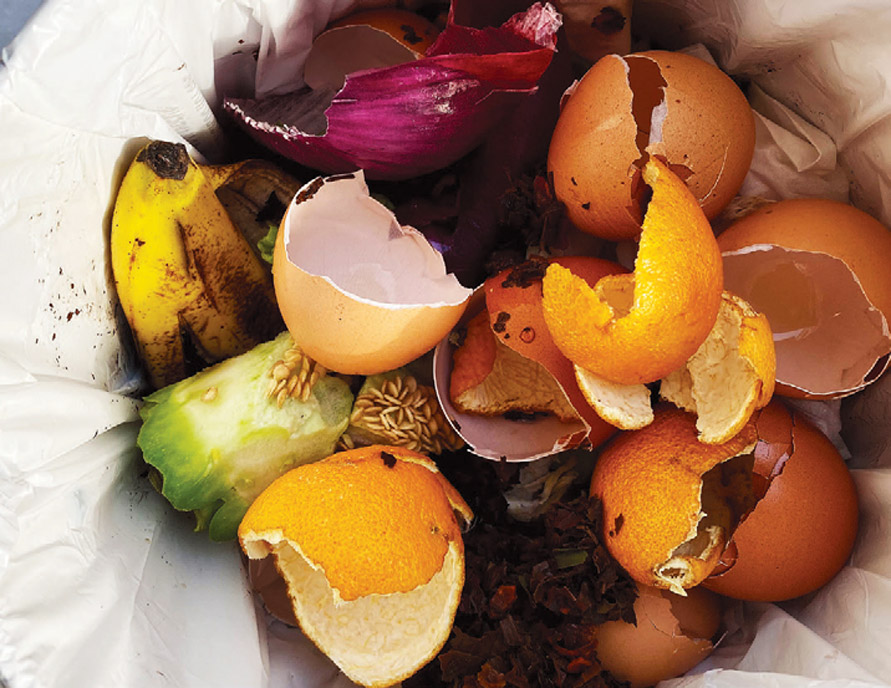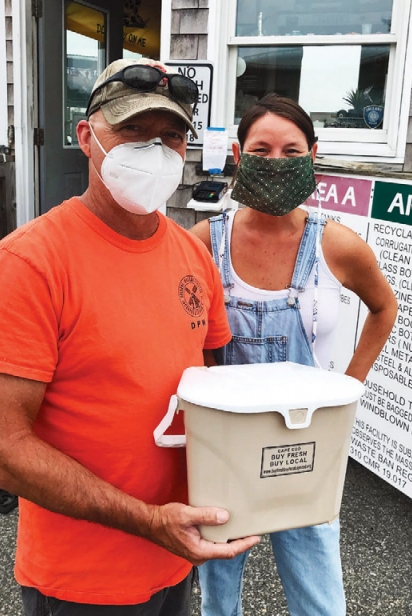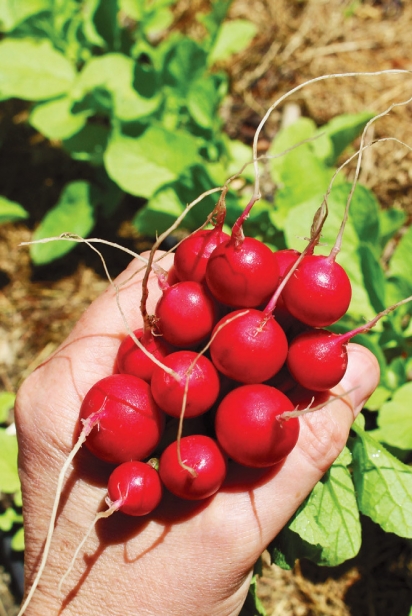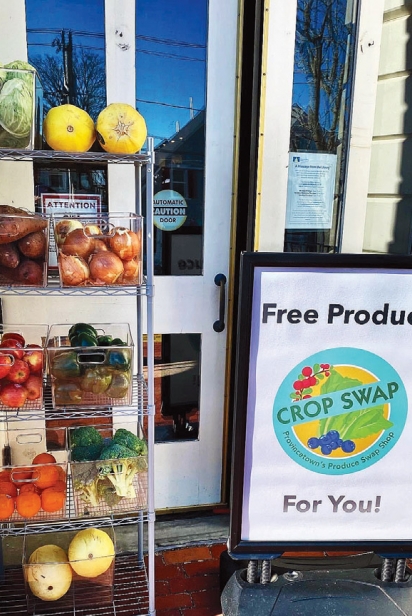The Bounty and the Byproduct...Reducing Garden Waste
There’s nothing worse than sticking your hand into a basket of gorgeous, ripe tomatoes, only to realize you’ve grabbed something that’s oozing. Or when you open the fridge to take out the beautiful head of lettuce that you carefully wrapped in a kitchen towel, and it’s slimy. Or what about that 16-inch zucchini that’s been sitting on your kitchen counter getting softer by the day?
Last year many people took to their gardens, or began gardening for the very first time, as a way to find solace during uncertain times. I was one of them. We planted more than we could possibly eat because it was something we could control, and it helped us nourish our families when many grocery store shelves were bare. But there was also a lot of food waste in the garden. Kale planted too closely became diseased. Cucumbers were left hanging on their vines. Bok choy bolted during the first heat wave.
It’s easy to reduce food waste in the garden, though. It’s all about planning, composting, and donating. You can plant this year’s garden with confidence, knowing that what you are growing will not only feed your loved ones, but your soil, and your neighbors.
THE CAPE COD COOPERATIVE EXTENSION
Cape Cod Cooperative Extension Regional Waste Reduction Coordinator, Kari Parcell, plans her garden just like she plans her meals. “We don’t want to have anything in our refrigerators go to waste, just like we don’t want anything in our gardens to go to waste. Plant what you know you like to eat, and not just for the sake of growing something,” says Parcell. Only plant the amount of fruits and vegetables you think you and your family will realistically eat, without having zucchini coming out your ears by the end of the season.
During certain times of the year, you can’t help but have an abundance of something, whether it’s cucumbers, tomatoes, or summer squash. “Have a plan in place before you get bogged down harvesting, like you do for meal planning. Have fun, get creative,” says Parcell. Rummage through your dented recipe box for your mother’s tried and true favorites or surf the web to find more creative ways to use up your surplus. If you love pickles, set aside brining spices. If your kids love tomato sauce, take out the canning supplies. (Speaking of canning supplies, be sure you have enough lids before you even begin amending your garden soil this spring. They were nearly impossible to find last year.)
It’s always fun to gift baskets filled to the brim, too. Pick up an assortment of small baskets the next time you go thrifting, so that at the end of the summer you’ll be able to surprise your friends and neighbors with the fruits of your labor. “It’s a great way to deal with some of the excess,” says Parcell.
Another easy way to ensure that garden waste and food scraps don’t become part of landfills, is by composting at home or by using one of the many composting programs available to residents at local transfer stations. Nine out of fifteen towns on the Cape offer food waste collection. Chatham Transfer Station has the oldest food waste collection program and has been doing it for almost ten years. “People can bring their compost waste bins and dump them in a large toter at the transfer stations. Then a third-party vendor, a composter, will pick it up, take it back to their composting farms, and then turn it into nutrient rich compost that can be sold,” says Parcell. Check individual transfer stations’ websites to see what garden and kitchen waste they’ll allow.
If you’d like to turn your rotten bananas, eggshells, coffee grounds and shredded newspaper (among other things) into something special filled with beneficial microbes, backyard composting, or small space composting, is the way to go. It doesn’t take up a lot of time or space and contrary to popular belief, it doesn’t smell or attract unwanted critters. “There are a couple of different ways residents can compost,” says Parcell. One option is to buy a backyard composter (a tumbler or an EarthMachine). They vary in size, shape, and price, so shop around. Other options include making a compost heap by dumping leaves and food waste into a pile and using a pitchfork to aerate it or by salvaging free, heat treated (stamped HT) wood pallets and making your own compost bins. “You just want to make sure that you’re cooking it at about 160 degrees, and you’re either turning it or spinning it,” says Parcell. After that, it cures for a while before it turns into what’s called black gold. While it’s curing, “you’ll start to see little microorganisms in there, little worms, and tiny compost bugs doing their thing. And that’s good,” says Parcell. Eventually, it will be ready to be mixed back into your garden soil. “Cooking it, curing it, then using it in the garden – those are the steps that worked best for me, but everyone has their own success story with backyard composting,” says Parcell.
BLACK EARTH COMPOST
Backyard gardeners, who live in these towns and don’t want to compost themselves, can bring their food scraps to the Falmouth Transfer Station and the Mashpee Transfer Station to be composted. Black Earth Compost will do the rest. According to Black Earth Compost’s website, their mission is “to collect food waste, process it into nutrient rich compost, and return it to the community. There it will re-enter the growth cycle in your backyard or at a local farm, creating zero waste.”
Fruits and vegetables from the garden can include stems, skins, pits, and seeds. And if you’ve hosted a clam bake or boiled a few lobsters, be sure to throw those shells in with discarded potato peels and corn cobs because they’ll help add calcium, phosphates and magnesium to the compost.
Residents who are interested in residential curbside pickup instead, should contact Black Earth Compost directly.
GROW-A-ROW FOR NEIGHBORS
Of the many Sustainable CAPE (Center for Agricultural Preservation & Education) programs, Grow-a-Row for Neighbors was started by two forward-thinking Nauset Regional High School students in 2017. It’s been growing one row at a time ever since Eva Kuchinsky and Polly Watson created this brainchild for the outer Cape.
According to Sustainable CAPE Founding Director, Francie Randolph, farmers’ markets serve as a sort of food hub for this endeavor. “Community members literally grow an extra row of their favorite fruits and vegetables in their own gardens, bring the excess to farmers’ markets, and food pantry volunteers will pick up the produce at the end of the day. Between three to five markets on the outer Cape will be running this program.” Currently, Sustainable CAPE is also working with interns – some are Nauset Regional High School interns, and some are Registered Dietitian Nutritionist interns – to roll out the program at all farmers’ markets from Provincetown through Brewster. Check their website for updates or contact your local farmers’ markets to find out more.
Gardeners can bring their unprocessed, unpackaged, uncut (preferably washed) produce to the farmers’ markets and drop them in the baskets provided. “Tomatoes are always desirable, and berries are always very, very hot commodities,” says Randolph. One of the beautiful perks about this program, above and beyond the feeling you get when you donate a bunch of freshly-picked blackberries, is that kindness begets kindness. Sometimes as shoppers are walking past the table, they’ll toss in some of their own money, which the interns use to purchase more fruits and vegetables from other farmers at the market (at a discount at the end of the day) that are then donated to the food pantries. “It’s added an economic boost to the farmer, and then the farmer also often donates, so it’s a great program,” says Randolph.
SHARE YOUR BOUNTY
According to Patricia Gadsby, creator of Share Your Bounty, “This Farming Falmouth initiative was started last year in response to COVID-19, after hearing a lot of people say that they were expanding their gardens or that they were starting a garden for the very first time and they didn’t know what to do with all their produce.” Sometimes when you plant all those tiny seedlings in the spring because you are just eager to dig in the dirt, you have no idea how prolific they’ll grow, or how much yield they’ll produce by summer’s end.
Before the pandemic, the Falmouth Service Center (FSC) was able to handle individual gardeners dropping off bags of potatoes or bundles of bright, orange carrots that had just been pulled out of the ground in an ad hoc kind of fashion, but COVID-19 changed all of that. They just didn’t have the volunteer staff to handle it.
The FSC was going to continue to pick up excess produce from the Falmouth Farmers’ Market, including produce gleaned from farms, so that was already in place. “So that gave me the idea. I thought, why don’t we just piggyback Share Your Bounty with gardeners’ donations,” says Gadsby. “It would be in one central place, they wouldn’t need to bring an extra van, and it wouldn’t be coming in dribs and drabs.”
Gardeners who would like to share their bounty are asked to put their prized produce in a bag with their name and contact information on it (email and phone) and bring it to the Falmouth Farmers’ Market. Share Your Bounty has a station right next to the Falmouth Farmers’ Market manager’s tent (easily noticed by its colorful sign), and volunteers will place your bag in a cooler and deliver it to the FSC where your fruits and vegetables will be distributed to its clients the next day. Eggplant was a very sought-after vegetable last year, as were all varieties of tomatoes. You can never have too many tomatoes!
Share Your Bounty is organized by Farming Falmouth in collaboration with Falmouth Farmers’ Market and the Falmouth Service Center, and made possible by a grant from Martha’s Vineyard Bank. If you are wondering who organizes the FSC pickups, who calculates the amount of food donated, and who logs in all that information at the FSC, it’s Jay Burnett. And according to Gadsby, they couldn’t do it without him.
According to the Farming Falmouth winter newsletter, “Farming Falmouth shared over 2000 pounds of locally grown fresh produce with our neighbors at the FSC last summer.” Over fifty local gardeners, vendors at the Falmouth Farmers’ Market, and Farming Falmouth gleaners who partnered with Pariah Dog Farm, helped prevent hundreds of pounds of eggplant, beans, peppers, cucumbers, zucchini and tomatoes (just to name a few) from going into the landfill (or compost heap) and instead put them onto the plates of many Cape Cod residents. “I was gob smacked by how generous people were,” says Gadsby. “Share Your Bounty is something so special, I think it could be done all over the Cape.”
CROP SWAP
In September 2019, Provincetown Public Library collaborated with the Provincetown Health Department and the Soup Kitchen in Provincetown (SKIP) to create a year-round program that reduces food waste and adds fresh fruits and vegetables to the repertoire of resources that are available to the public. When Library Director Amy Raff was approached by Provincetown’s Health Department Director, Morgan Clark, about putting a community refrigerator at the library to provide access to nutritious produce, she was all in. “The economy of the library is one of sharing. Anytime we can facilitate sharing – be it knowledge, materials or produce – it is a good day at the library,” says Raff, “since the beginning over 7500 pounds of produce have been distributed.”
Backyard gardeners can donate their fresh, uncut produce during any regular library hours at the library’s Commercial Street entrance. The handsome Crop Swap refrigerator and shelving (for produce that doesn’t require refrigeration) is “located on our first floor that people can freely access. It is literally a ’free for all,’” says Raff. No oversized zucchini will be turned away.
Follow Crop Swap on Facebook or at @provincetownlib and/or @ptownhealth on Instagram for updates.
CAPE COD HUNGER NETWORK
According to the Cape Cod Hunger Network’s website, “The Cape Cod Hunger Network (CCHN) is a growing coalition of organizations, including Cape food pantries and state and local agencies, that help coordinate food security programs.” Its list of local food pantries is extensive and updated frequently.
While the Hunger Network would normally welcome home-grown vegetables from people’s gardens, some pantries are offering more streamlined food packages due to the pandemic and contact with volunteers. Kim Concra, Cape Cod Cooperative Extension’s nutrition and food safety specialist, also co-chairs the CCHN. According to Concra, “people are encouraged to contact their local food pantries before making any deliveries because some are more capable of accepting produce than others.” This has to do with potential storage issues, as well as the fact that they may only open once or twice a week. It depends on the individual pantry and what their facilities are. “The good news is that over the last several years many more pantries have been able to secure refrigerators and freezers and are able to store produce, so we’re seeing a lot more fresh fruits and vegetables in food pantries than ever before. Nothing can compete with a homegrown tomato,” says Concra. She also notes the generosity of a local farmer. “Over several years Tim Friary of Cape Cod Organic Farm grew and donated literally tons of sweet potatoes and butternut squash to the food pantries. It was really amazing.”
Gardeners should check the websites periodically throughout the growing season as cases decline, restrictions are lifted, and more people get vaccinated. For over a year, COVID-19 has wreaked havoc and caused more and more families to struggle to put nutritious foods on their plates. If you are able to donate even just a small portion of your garden harvest, it would be a kindness that would not go unnoticed. Every head of broccoli, basket of green beans, or bag of onions helps.
capecodextension.org
blackearthcompost.com
sustainablecape.org
farmingfalmouth.org
capecodhungernetwork.org
provincetownlibrary.org/crop-swap
capecodhungernetwork.org








